COMMUNITY ROOTS





The Servicemen's Readjustment Act of 1944, signed by President Franklin D. Roosevelt, prevented a surge of unemployment the U.S. Department of Labor estimated would affect 15 million people.
More commonly referred to as the G.I. Bill™, the act was designed to provide World War II veterans with unemployment insurance, and funds for housing and college, putting higher education within reach of millions of veterans.
Within seven years, 2.3 million of the 8 million veterans offered educational benefits attended college and millions more received job training. The number of degrees awarded by U.S. colleges and universities more than doubled between 1940 and 1950.
Those benefits fueled construction and home ownership, with veterans responsible for 20 percent of all houses being built and more than $33 billion granted in home loans. That investment in our nation’s veterans averted an economic depression and, in the years since,
has provided tens of millions of veterans with educational opportunities at colleges across the nation, including right here at SUNY Adirondack.
Since its inception in 1961, SUNY Adirondack has recognized the value of life experience, discipline and skills our nation’s veterans bring to our classrooms — as well as the sacrifices they make to protect our freedoms.

Throughout the years, the high concentration of our region’s citizens who enlist in the U.S. military forces has been evident by a considerable number of veterans on campus. That led to development of a Veterans Club and, ultimately, Randles Veterans Resource Center.
In June, SUNY Adirondack was awarded a contract with Warren County to operate Adirondack Peer-toPeer Support Services, A PFC Joseph P. Dwyer Project. The grantfunded program uses a peer-to-peer approach to assist veterans in
Warren and Washington counties. In October, the college hired former Marine Jeremy Duers as program coordinator. (Learn more about Duers on Page 20.)
Duers immediately began networking with administrators of veterans’ programs and services throughout the two counties, and engaging with veterans on and off campus.
SUNY Adirondack’s application for the Adirondack Peer-to-Peer grant was the latest step in a long history of ensuring those who serve our nation have access to the educational benefits they earned and deserve. We are proud to welcome nearly 200 students a year who are veterans or veteran affiliated (children and spouses of veterans).
We offer veterans in-state tuition, no matter their residency; a support group and resource center once they’re on campus; and — most importantly — a proud legacy of shared commitment to community and opportunity.
At the height of the Vietnam War in 1966, Randy Glenn was 20 years old and knew the likelihood of being drafted.
“I had a few unsuccessful attempts at college for a couple of years,” he said. So he enlisted in the Air Force.
“I asked for language training, looking to use my German,” he said. Instead, he was sent to Indiana University for nine months of intensive training in Russian.
The language skills he developed were put to use in two tours, one in Turkey and the other in Japan. Glenn can’t share much about his time as a linguist in the United States Air Force
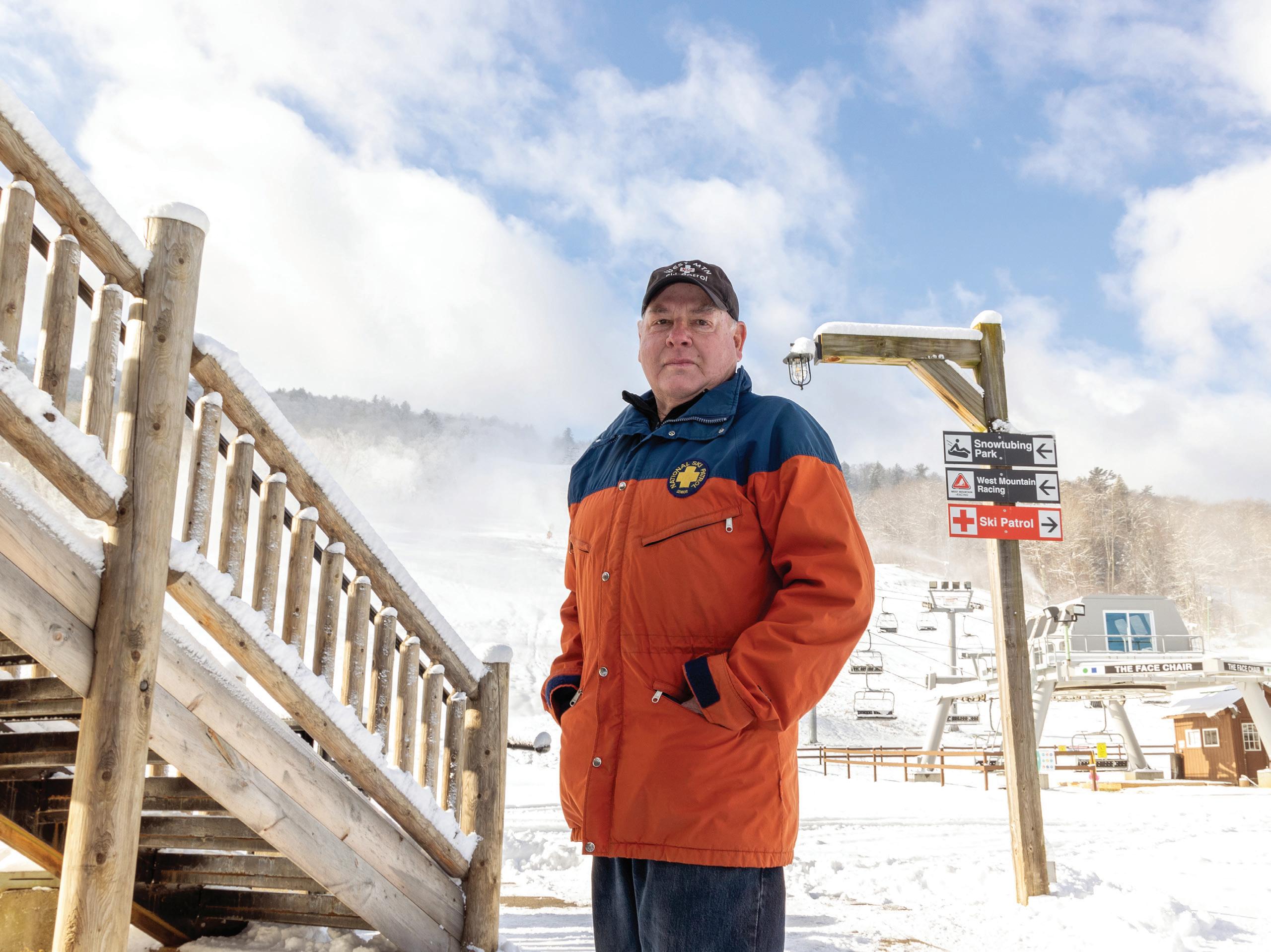
— “I was in the Air Force Security Service and had a top-secret security clearance,” he explained — but his memories of those four years are visceral.
“When I got off the plane, the first thing I noticed was the aroma in the air was different,” Glenn remembered. “It was Turkish tobacco I was smelling.”
His first night in the western Asian country, he was sitting at a cafe, waiting for a ferry to take him and fellow service members across the Sea of Marmara, where their base was located. Two local men sat down with the Americans and began speaking Turkish.
“We didn’t speak it, but eventually one of them said, ‘Does anyone speak German?’,’ Glenn said. “We had a philosophical conversation — them speaking German to me, me translating in English, then back to German — right on the get-go my first night in Turkey. I found it fascinating.”
He spoke fondly of flocks of sheep shuffling down the main street of Istanbul. “It was like stepping back two centuries,” he said.
On days off, Glenn traveled extensively. “The most exciting thing: I found out there was skiing about 50 miles south of the base, so I rented skis and skied in Turkey, with just tons of snow,” said
“I used every penny of my education benefits.”
the 30-plus-year member of the National Ski Patrol at West Mountain.
Glenn found as much to love about Japan, where he bought a motorcycle and spent days off on it exploring the island. “It was a beautiful location, the people were fantastic,” he said.
Serving on the other side of the world, Glenn was somewhat protected from the intense animosity stateside surrounding the Vietnam War, much of which was directed toward returning service members.
The infamous Kent State massacre — a May 4, 1970, event in which four Kent State University (Ohio) students were killed and nine injured when members of the National Guard opened fire on a crowd gathered to protest the war — happened just weeks after Glenn returned to Glens Falls.
By then, he had enrolled at SUNY Adirondack and was dating Barbara, to whom he is still married.
“I asked her, ‘What’s this all about? I don’t understand; we didn’t hear about this overseas,’” Glenn said, choking up at the memory. “When I saw that, I got rid of everything that was military and enjoyed my freedom.”
“I was home, I was free of any military responsibility, going to ACC, had a job working at a restaurant, and dating Barbara,” he said. “And life was wonderful.”
Glenn finished earning a degree in Liberal Arts at SUNY Adirondack, then transferred to Indiana University, from which he earned a bachelor’s degree in Russian Language and Literature.
didn’t do any of the things you said, but I’d like a career.’”
He was hired, started off in management training and retired as a vice president 30 years later, in 2001.
Since retiring, Glenn has stayed busy. “I don’t have any free time,” he laughed. “It’s amazing. I’m still heavily involved in all sorts of volunteer activities.”
He fulfills his lifelong love of music singing in the First Presbyterian Church Choir — which he has done since he was 8 years old — and Glens Falls Senior Citizen Choir; serves as secretary of the Glens Falls Symphony board of directors; cheers on his grandchildren in athletics; and travels with Barbara around the U.S. and the world, including frequent visits to Colorado, where one of the couple’s two children lives.
After graduating from IU, Glenn and Barbara, who married in 1972 before heading out west together, returned to Glens Falls.
“I met with the president of Glens Falls National Bank, and said, ‘I sat down with you once and talked about a possible career in banking’,” he said. “‘You told me what to do, and I joined the Air Force and went abroad, and
Glenn became thoughtful about whether he would recommend enlisting to young people today.
“I am proud to be a veteran and proud of my service,” he said, but stressed he was grateful his son was never drafted. “I just want our children to be happy, and they’re both happy in what they’re doing, and that makes me happy.”
“I certainly appreciate the benefits of the GI Bill™,” he said. “I used every penny of my education benefits. I had nothing at the time and it was very important to me to get those.”
When the science teacher turned his back, Bruce Bocchi quickly disconnected the class bunsen burner from the gas line and hooked it up to the water source.
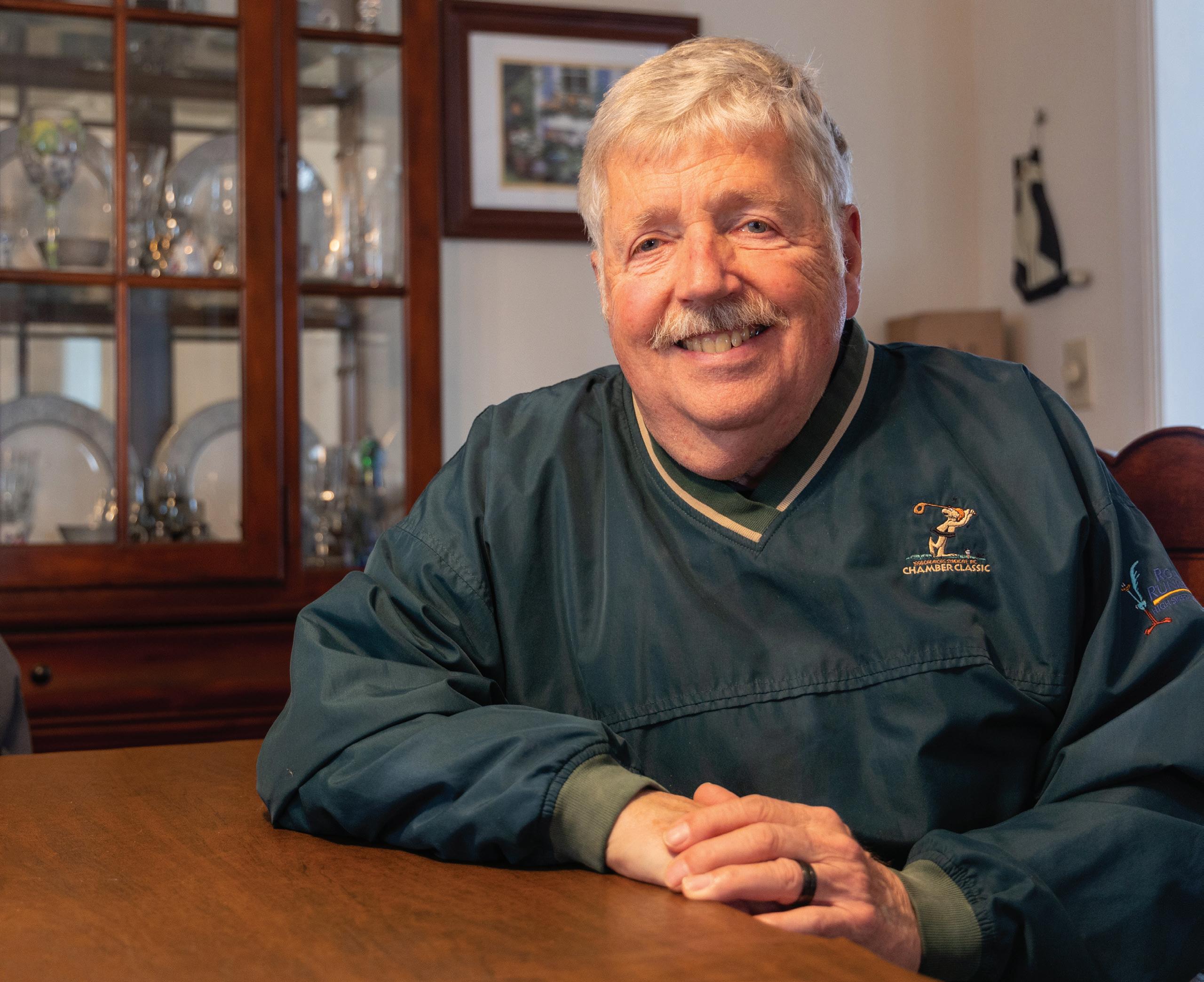
“The teacher turned to demonstrate and it sprayed water all over him,” laughed Bocchi, who is now in his 70s, but clearly still has some of the spunk that got him in trouble that day in high school. “I’m a funloving guy.”
That sense of humor charmed decades of shoppers at regional Price
Chopper stores, where Bocchi was a butcher. But in 1968, not everyone found his antics amusing.
After pulling a prank (the details of which he still won’t divulge) on a professor, Bocchi was asked to leave SUNY Adirondack, where he enrolled after graduating from Hudson Falls High School.
“I had a dispute with one of the instructors, who happened to be a retired lifer from the military and he thought a stint in the military would do me good,” Bocchi remembered.
“We had a little discourse and, within a month, I was drafted.”
Bocchi was deployed to Vietnam as a helicopter door gunner and crew chief with the 101st Airborne of the Army Air Service.
“I was drafted in September and was in Vietnam by March 14,” he said. “I was standing 30 miles from the DMZ (demilitarized zone).
I listened to the moon landing in July, my niece was born while I was
“ACC taught me how to study and learn the occupation
I ended up with.”
HOMETOWN: HUDSON FALLS, NEW YORK 1973 GRADUATE OF SUNY ADIRONDACK WITH A
IN
AND DESIGN SERVICE: U.S. ARMY, 101ST AIRBORNE, 1968-1971
CURRENTLY: RETIRED AFTER A 45-YEAR CAREER AS A BUTCHER
over there in June, and I turned 21 when I came back home in May 1970.”
When he returned to the U.S., he served out his remaining time in Texas, then moved to Glens Falls, where his wife — whose family owns Villa’s Bread — grew up. He started working again at the supermarket where he had a job throughout high school and took a meeting with then-SUNY Adirondack President Charles Eisenhart. “I had to show him I had changed my ways and was no longer the wild guy I was three years before,” he said.
He worked 48 hours a week at the supermarket and attended SUNY Adirondack as a full-time student. Amid the political and social turmoil of the 1970s, he found it difficult to fit in.
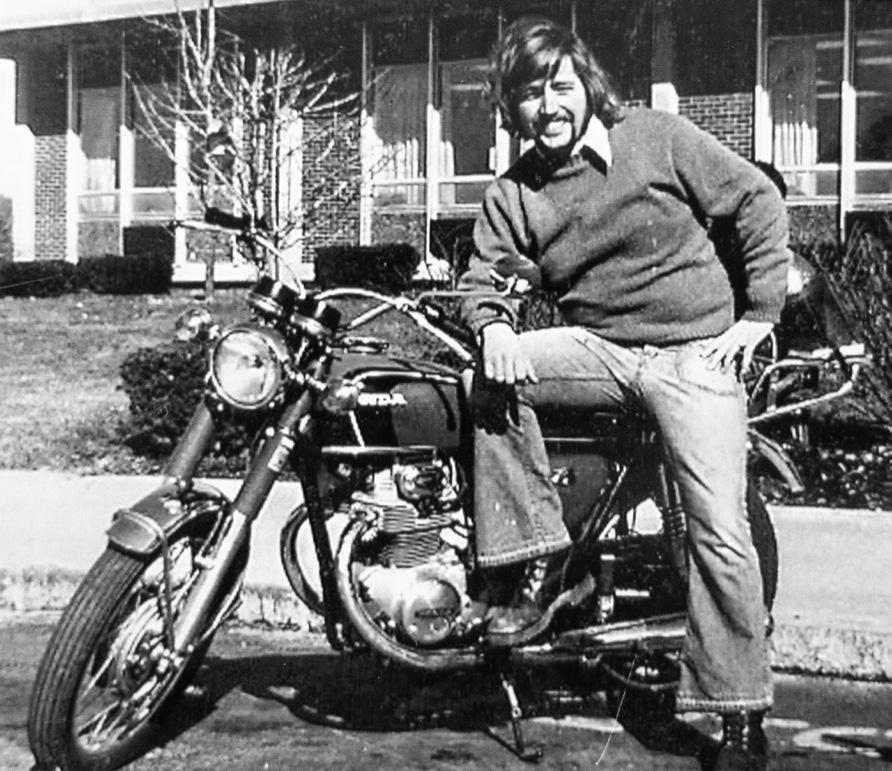
“When I was at ACC the first time, I played a lot of pool, played a lot of pitch, played a lot of ping pong, went to a lot of parties and did a lot of drinking,” he admitted. “When I returned, I was a combat veteran and the people at ACC were kids. I was only 23, but so much older all of a sudden, so it was different.”
The world off campus wasn’t inviting, either. Bocchi was encouraged to join veterans groups in the community, but when he talked to World War II veterans at local bars, he was told, “Vietnam isn’t a war, it’s a police action.”
The discrimination didn’t end there. “We came home after being in Vietnam and they gave us brand-new uniforms so we could dress up, but they told us not to wear them because we would be targets,” he said.
He graduated from SUNY Adirondack in 1973. “There was a recession, the gas prices were high and there were no jobs,” he said.
The degree he earned in Drafting and Design would have qualified him to work in the construction field, but every job was offering $5 an hour and Bocchi was earning $7 an hour at the store.
“‘Jeez,’ I thought. I was trying to buy a house,” he said, noting that he still lives in the Glens Falls home he bought in 1973.
“In Vietnam, I was a crew chief on Huey and Cobra helicopters, so I worked on turbine engine mechanics,” he said. “The thought was, back in the day, all us aviation guys would get air frame and power licenses — that’s a license to work on commercial aircraft — and that would have been a good career, but you have to live in a city.”
Leaving this region was not a sacrifice Bocchi was willing to make. “We’re an Italian family, we like to be close together.”
He decided to become an apprentice meat cutter, a three-year commitment. He continued work at the supermarket while in the program.
“ACC taught me how to study and learn the occupation I ended up with,” he said, noting that becoming a meat cutter required correspondence classes through Cornell.
He went on to become a meat manager at Price Chopper, a job he held for 45 years. In that time, Bocchi and his wife raised two daughters — each of whom, he proudly pointed out, is a college graduate — and he built a reputation.
“I brought my wife’s aunt to an appointment the other day, and a woman waiting for an MRI said, ‘You’re the meat man from the Cooper Street store,’” Bocchi laughed. “You work 45 years in one organization and you get to meet a lot of people.”
“IT WAS VERY DISRESPECTFUL, BUT WE WERE JUST KIDS,” BOCCHI SAID.
“I was worried about regaining security in a complex attack, but luckily nothing followed,” said Dorvee, a first sergeant in the U.S. Army National Guard whose vehicle was attacked by a Vehicle-Born Improvised Explosive Device (VBIED) — more commonly known as a suicide bomber — while
patrolling a border patrol compound in Afghanistan in 2008.
“A white pickup truck pulled over to the side of the road; once my vehicle passed, he gunned it between my vehicle and the vehicle behind me, detonating himself,” explained Dorvee, who along with two other soldiers injured in the attack were awarded Purple Hearts, a military decoration awarded in the name of the U.S. president to those “wounded or killed
in any action against an enemy of the United States or as a result of an act of any such enemy.”
“We joke about it being called ‘the enemy’s marksmanship badge,’ not something I ever wanted to earn, especially when it falls into a category with deceased soldiers and ones who were severely injured,” Dorvee said.
He suffered a mild traumatic brain injury and a perforated ear drum in the
 Jeffrey Dorvee struggled toward consciousness, his ears ringing and his head pounding.
Jeffrey Dorvee struggled toward consciousness, his ears ringing and his head pounding.
“Having the ability to assist people in need and respond under pressure always got my adrenaline going”
attack — not life-threatening injuries, thankfully — but Dorvee describes the event as a life-changing moment. “I was trying to understand how someone could sacrifice themselves like that,” he wrote in an email from the Horn of Africa, where the 40-year-old Queensbury father of two is deployed as part of Operation Enduring Freedom. “I don’t understand how or why one person would be willing to sacrifice his life.”
But Dorvee is no stranger to sacrifice. He enlisted in the Army straight out of high school, inspired by the Sept. 11, 2001, terrorist attacks, which he watched on TV from a classroom in South Glens Falls High School, where he was a junior at the time.
“That solidified my decision to join the Army,” he said.
He served with the 25th Infantry Division in Hawaii from 2003 to 2006. His unit was deployed to Afghanistan from 2004 to 2005.
“I was 22 years old,” he remembered. “Our up-tempo was very high and we were the tip of the spear, as far as kicking in doors and chasing bad guys.”
He left the Army in 2006, joined the New York Army National Guard and enrolled at SUNY Adirondack to study Criminal Justice.
“I decided to take advantage of the educational benefits I received from the Army,” he said.
At the college, he loved learning something new every day. “I also loved the fact that everyone has a different path,” he said. “Some are fresh out of high school, some are attending for the first time at an older age … there was a lot of life experience.”
In 2012, while serving as a traditional National Guardsman, Dorvee put his degree to use and became a corrections officer at Great Meadow in Comstock, a job to which he plans to return after retiring from his now-fulltime role in the National Guard.

“After being in the military, I really wanted a job in law enforcement. Having the ability to assist people in need and respond under pressure always got my adrenaline going.”
While in the National Guard, he was deployed for a second tour in Afghanistan, which is when he was injured. In the years since, Dorvee and his wife,
So being overseas this year has taken even more of a toll. “This is the hardest deployment for me,” he said. “My previous deployments, I had to worry about myself and keeping in contact with Shannon. This time, I’m missing my kids grow and excel at school and sports, and holidays mean more having kids.”
But knowing he is part of something bigger — whether overseas or stateside, where he has been deployed several times for relief missions after natural disasters — keeps him going. “In all my tours overseas, the local populace have been grateful, especially when we roll into towns with food, water and medical supplies,” he said. “I always told myself we are there fighting in Afghanistan so the fighting would not take place in the United States, like 9/11; for the most part, we took the fight to them.”
“Being in a position where I am able to assist American citizens during a crisis is very gratifying,” he said.
HOMETOWN: SOUTH GLENS FALLS, NEW YORK 2008 GRADUATE OF SUNY ADIRONDACK WITH A DEGREE IN CRIMINAL JUSTICE SERVICE: U.S. ARMY, 2003-2006; NEW YORK ARMY NATIONAL GUARD, 2006-PRESENT; PURPLE HEART AWARD WINNER CURRENTLY: E-8 (FIRST SERGEANT) FOR DELTA COMPANY 1-69TH INFANTRY OUT OF LONG ISLAND, NEW YORK, DEPLOYED TO THE HORN OF AFRICA WITH OPERATION ENDURING FREEDOM; CORRECTIONS OFFICER AT GREAT MEADOW Shannon, welcomed twin sons, who are now in middle school. PHOTO CREDIT: BRIANA LYONS/ GLENS FALLS LIVINGThe little boy was only about 4 years old, not much older than Shane Donaldson’s daughter back in the United States. But this child needed help.
So Donaldson and other members of his infantry loaded the child and his father into the back of a Humvee, and transported them to a larger military base in Iraq where the boy — who was born with “webbed” legs, with skin connecting his thighs and calves with his knees in a permanently bent position — would undergo lifechanging surgery.
“Helping people in the local community was satisfying,” said Donaldson, who
was deployed with the Army National Guard to Iraq in 2004, in the early days of the Iraq War.
When Donaldson enlisted in 1999, the United States was in a time of peace with no clear threats on the horizon. During basic training, a drill sergeant trying to convince Donaldson to enlist as active duty joked — uncharacteristically: “If George Bush wins the election and you’re going to be in the National Guard, you will see war at some point,” Donaldson said. “I laughed at the time and thought, ‘That’s not a possibility.’”
Even as he watched the Twin Towers crumble on television during the Sept. 11, 2001, attacks, Donaldson still never thought being involved in war was
likely. He was put on active duty and assigned as part of a security detail at JFK International Airport for about a year.
“A lot of people signed up after 9/11, saying ‘I want to be part of this,’ but there was never an idea in my head the direction it would go,” he said.
Donaldson was working at a mortgage company locally when mentions of weapons of mass destruction started appearing in the media. “We started to hear rumors about the possibility of being activated and, by the end of 2003, we had been,” he said.
After training at Fort Drum for three months (during which, Donaldson wryly pointed out, they were trained

“Helping people in the local community was satisfying; there was some good that was done.”
HOMETOWN: WHITEHALL, NEW YORK
SERVICE: ARMY NATIONAL GUARD INFANTRY, 1999-2007
for the environment they would face in Iraq in the middle of an upstate New York winter), his infantry unit flew to a small base in Balad, Iraq.
For the first few months, Donaldson was involved in presence patrols, which he described as visiting rural areas around a large air base, providing security and meeting local sheiks and authorities to establish relationships.
“For the most part, we had nothing but positive interactions with people,” he said, describing local children’s interest in all things American; the infantry passing out soccer balls and school supplies; and escorting engineers to help improve schools and water sources in villages.
But in April 2004, everything changed. “Everything happened all at once,” Donaldson said. “Good Friday was the start of it for us, as things started to heat up across the country.”
By the time President Bush gave his now-famous “Bring ’em on” speech in July of that year, Donaldson had already been engaged several times.
Donaldson never had a plan to join the armed services. When he finished high school, he studied art for a few semesters in college, but left to help care for his mother, who was battling illness. When he signed on to the National Guard, he did so for the educational benefits.
“I had a great deal of pride about serving my country and the camaraderie in my platoon, but I always had questions regarding what we were doing there,” he admitted. “You are going to do what you’re supposed to do, you enlisted for it, you’re going to complete the mission. You can have your questions, but you just have them in private.”
Those mixed emotions left Donaldson no doubt that after fulfilling his enlistment, he would not re-up. He returned to the U.S. and the mortgage business, but found a changed industry. “‘I don’t think I’m meant for this, really’,” he remembered thinking.
But coming back from Iraq after serving was a huge adjustment for him and his family. As a veteran with time, resources and a new perspective, he looked at a SUNY Adirondack brochure and selected Internet Technology: Networking. “I wanted something different, something suitable to pay some bills,” he said.
Before graduating, he secured a job in IT at Moses Ludington Hospital in Ticonderoga. Most days, he drove to Ti in the morning to start work, drove back to SUNY Adirondack for classes, returned to the hospital to finish the work day, then went home to his wife and two young children. (His now19-year-old daughter learned to walk while he was in Iraq. His son, now 18, was conceived at Fort Drum and born when Donaldson was on leave in September 2004.)
He was so busy, in fact, he didn’t apply for a diploma, which using credits that transferred to SUNY Adirondack ended up being in Media Arts, until 2010, years after he finished classwork. He worked at Adirondack Radiology, then in a machine shop before seeing a job listing in IT at SUNY Adirondack, for which he applied and was selected.
In recent weeks, Donaldson was promoted to director of Technology Support Services at the college that taught him the essentials of his field. “I liked the program and had confidence what we were doing would set me up for employment,” he said. “I enjoy this line of work for the fact that I can be doing a lot of different things on any given day, I face new challenges and get to work with new technology that’s coming out. I am, by nature, a service-oriented employee and really value the community I serve at SUNY Adirondack.”
He credits his time in the Army National Guard with the opportunities he has been provided.
“Each opportunity I’ve had in learning, my first IT job — they have all opened up because of the opportunity to serve the country,” he said. “War isn’t a fun thing, but there’s nothing I regret.”
Jason Hall was working on his lawn when an older gentleman stopped in front of the Hall home and got out of his car.
“He said, ‘You’re in the Marine Corps. Have you heard of the League? Have you thought about joining?’,” recalled Hall, a 2021
graduate of SUNY Adirondack and a Marine Corps veteran who served in the mid-1990s.
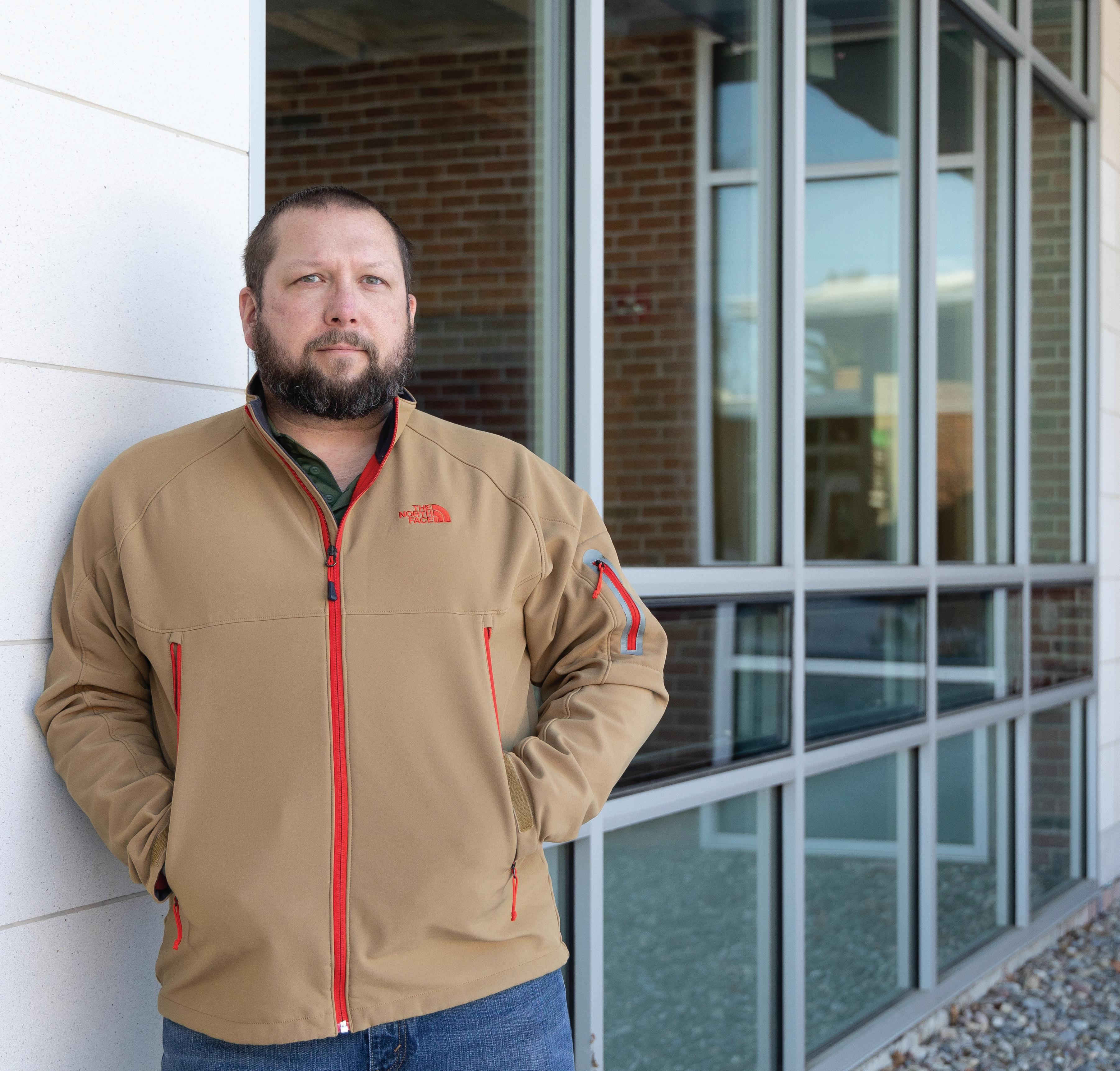
Lured by a competitive shooting team, Hall joined the league more than 10 years ago. Today, he is the senior vice commandant for the Marine Corps League Memorial Detachment No. 2 out of Hudson Falls.
“I joined for the shooting team, but got involved with everything else they’re doing,” Hall said. “It’s a good place to make you feel good; when you go see each other, you’re never more at home than with other Marines.”
That sense of camaraderie is important to Hall, who said transitioning to
“SUNY Adirondack is good for people who have to still live a life and want to go to school.”
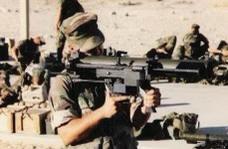
civilian life was a struggle. “What’s different for someone in the military is the trust factor. You have your friends, your brothers, the people you work with. In infantry, you’re so tight knit, we’re willing to die for one another. So when you get out and someone says, ‘We’re friends,’ it’s like, ‘What does friendship mean for you?’ You don’t trust people, there’s a lack of discipline and respect you don’t get in the military.”
Surrounding himself with fellow former service members has made a difference, so he’s proud to carry on the legacy of the Marine Corps League.
“We raise money for organizations that usually involve kids,” Hall said. “But it gives a place for Marines to come and be around each other.”
That’s important, Hall said, because of the high rate of suicide among veterans. “We have to get the message out better that it’s OK to need help,” he said.
When Hall graduated from Hudson Falls High School in 1994, he
enlisted in the Marines. “It was just a good choice in my life to learn some discipline and figure out what I wanted to do with my life,” he said.
He served four years at Camp Lejeune — 3rd Battalion, 6th Marines — and was deployed during Operation Desert Thunder to Iraq. His unit sailed through the Suez Canal, arriving in Kuwait. “It was just a sandy, hot, dirty place I don’t ever want to go again,” Hall said. “Everything was riddled with bullet holes; it was a hostile environment and you’re not wanted at all.”
He returned to the states, started dating the woman he would marry and enrolled in classes at SUNY Adirondack. “It’s good for people who have to still live a life and want to go to school.”
Hall sometimes took a semester off, or took just one class. “It took me a long time to get a degree, because I was doing it while building a life and raising a family,” he said. “The flexibility of being able to go to school here when you can worked well.”
He started as a Criminal Justice major and served as a corrections officer for 10 years. But he decided that wasn’t quite what he wanted, so he changed his degree program to Liberal Arts and started work at Irving Tissue, a family-owned business.
“It’s a large business, but they really care about the morale of the people and take care of us,” Hall said. “It allows me, as a leader, to use the things I learned in the Marine Corps.”
That sense of discipline also helped him stay on track in completing a degree.
“It was important I set a goal: I wanted my degree. I don’t need it for my job, but I had an opportunity to be a role model to my son. I showed him that even when you have commitments to a family and a job, you have a commitment to learning and to yourself.”
He lauded SUNY Adirondack’s dedication to veterans. “I know a lot of people who used the veterans services; it’s really important to have that space,” he said. “Younger men and women just getting out of the service really need that connection with each other, to take care of each other — just having that community of veterans is so important for their mental health.”
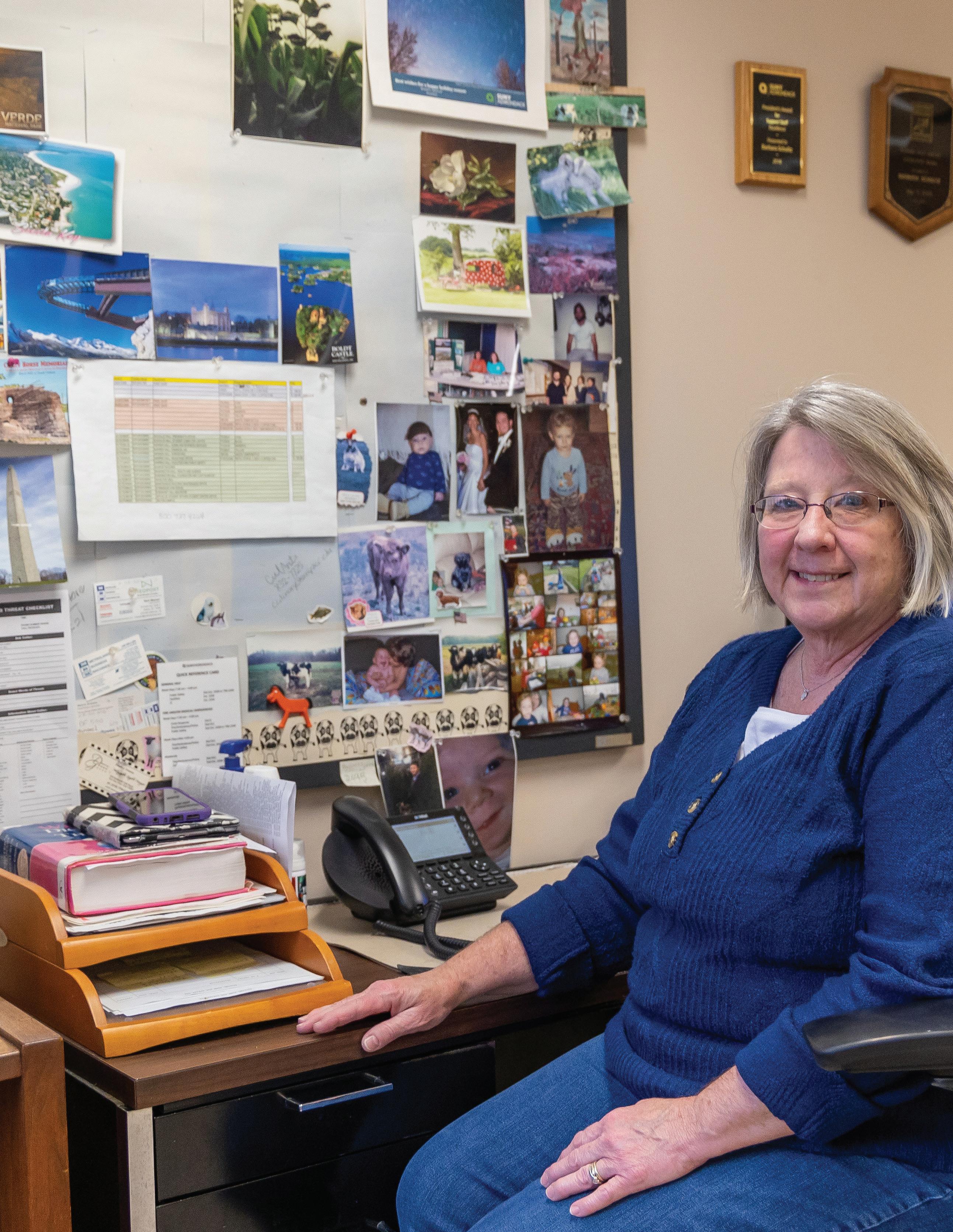
“I had the best job in the Navy.”
HOMETOWN: BONNE TERRE, MISSOURI
SERVICE: U.S. NAVY, 1978-1980; NAVAL RESERVES, 1988-1990
CURRENTLY: PRINT ROOM ATTENDANT AT SUNY ADIRONDACK
Throughout the late 1970s and into the ’80s, the U.S. Navy’s slogan was “It's not just a job, it's an adventure.”
The pitch worked on Barbara Schultz, who looked around her hometown and knew she wanted to get away.
“I just saw the same people sitting around the street corner who had been there for years, and I thought, ‘I don’t want that,’” she said. “I wanted to get out and explore and have adventure.”
So she enlisted in the U.S. Navy in October 1978 and went to boot camp in Orlando, Florida. She was assigned to serve as a Mess Management Specialist and sent to San Diego, California, where she underwent intensive training in cooking, baking, and dining and living area management at accession training — commonly referred to as “A school” — and met Bill, a Navy Machinery Repairman whom she eventually married.
“My goal when I was younger was to have a restaurant. I had always worked as a waitress and in restaurants, so when they offered me to be a cook, I thought, ‘It kind of goes along with what I want to do’,” Schultz said.
She quickly adapted to the schedule, in which she worked from 4:30 a.m. to 8 p.m. for two days, then had two
days off. She still wakes up at 4 a.m. “I liked the routine, the discipline, the adventure, new places and new people.”
“I had the best job in the Navy,” she mused. “You got to see everyone and everyone was your friend because you were the one fixing their eggs the way they wanted them in the morning. Preparing holiday meals — Thanksgiving, Christmas, Fourth of July — was special; it was like cooking for a large family, when everyone is away from their home. Those holiday meals were real morale boosters, a little bit of home away from home.”
She was stationed in Winter Harbor, Maine, a small fishing town on the Schoodic National Scenic Byway that overlooks Acadia National Park. “The barracks overlook the ocean,” she remembered.
Bill, though, was ordered to Groton, Connecticut — a nine-hour drive. After making the 18-hour round trip every weekend for a while, the couple married in Winter Harbor. When her enlistment was up, she left the active duty Navy to start a career as a Navy wife.
She raised the couple’s two sons, baby-sitting children in their home, which changed every two years. “We lived in Italy, Virginia, Pennsylvania, California …” she rattled off.
When their oldest son was starting high school, Bill Schultz retired from the Navy and, since he grew up in
this region, settled in the Saratoga area. “He wanted the kids to be settled,” Barb Schultz said.
Working at a day care center, Schultz began to take courses at SUNY Adirondack Saratoga, one or two a semester in the evenings. She would read her textbooks to the babies at work when she was studying, many of whom she now sees as students at the college. “I often wonder if that helped them,” she laughed.
Not long after, Schultz saw SUNY Adirondack’s print room attendant position listed and applied. “I liked all the people I met here before; they were friendly and helpful,” she said. “I wanted to be just as helpful.”
She has worked at the college for 19 years and is looking forward to retirement, when her sense of adventure will once again prevail, as she and her husband plan to travel the U.S. in their Airstream trailer.
One of her sons enlisted in the Navy; the other enrolled at SUNY Adirondack. “He graduated high school in 2000, so as 2002 approached, I said, ‘I’m almost finished and he’s going to graduate,’ so we graduated together.”

“I realized, ‘I’m tired of doing entry-level positions. What do I want my legacy to be? I need to go back to school.’”
SERVICE: U.S. ARMY, 1999-2011
everything — food, shelter, pay you extra if you’re a married family living off post — they bend over backward to take care of you,” she said. “When you leave, you don’t know how to set any of that up for yourself, you don’t know how to advocate for yourself.”
“There was a 2-mile-long procession of people walking to their Mecca for the first time in 30 years,” remembered Wojtowecz, who served in the U.S. Army during Operation Iraqi Freedom and was deployed twice. “When you have a moment in your life where you’re like, ‘I’m part of history right now,’ that was it.”
Wojtowecz joined the Army after graduating from Glens Falls High School. “I didn’t know what I wanted to do — who knows what they want to be when they grow up? I didn’t have any college money, so I decided to go in the Army.”
She served 12 years as a chemical operations specialist, earning the rank of staff sergeant.

“It was such a privilege to see a country transform,” she said of her time in Iraq. “Initially it wasn’t all capitalistic. We went in there, people were happy to see us, to be liberated. We helped them. We rebuilt their wedding venues, we donated uniforms to kids, we rebuilt schools — we did a lot of good.”
After leaving the Army, Wojtowecz struggled to readjust to civilian life. “The military babies you, they provide
Wojtowecz jumped into the working world, selling cars, working as an insurance claims adjuster, taking a year off to care for her ailing grandmother, then handling billing for transplant patients for an insurance company.
“I realized, ‘I’m tired of doing entrylevel positions,’ and thought, ‘What do I want my legacy to be?’,” so she enrolled at SUNY Adirondack, where she earned a degree in Information Technology: Information Security.
She decided to study IT at SUNY Adirondack after realizing she had a natural gift with computers. “Cybersecurity fell into my lap,” she said. “I was helping my manager link different systems together to be more efficient.”
When she was a student, she served as president of the Veterans Club and Phi Theta Kappa, an international honor society for students at open-access institutions. Under her leadership, the scholars group earned five-star status and increased its membership considerably. She earned the State University of New York’s special Military Service Award, which the Chancellor’s Office describes as “Special achievement
She was on the President’s List every semester at SUNY Adirondack — earning a grade point average of 4.0 while taking at least 12 credits — and graduated summa cum laude.
After graduating, she transferred to The College of Saint Rose, where she is earning a bachelor’s degree in Cybersecurity and a master’s degree in Computer Science. When she’s done, she wants to return to serving the United States.
for a former military student who has made a measurable impact on their campus.”
“I hope to work for Cybersecurity and Infrastructure Security Agency, Homeland Security. I want to help protect our infrastructure,” Wojtowecz said. “I like solving problems and technology.”
Jeremy Duers was visiting a friend at Manhattan School of Music, when he heard a percussionist in a rehearsal room play a complicated sequence flawlessly.
“My friend then told me it was sight-reading day and, at that moment, I thought, ‘I’m not going to be competitive in this field,’” remembered Duers, coordinator of Adirondack Peer-toPeer Support Services, a PFC Joseph P. Dwyer Project, at SUNY Adirondack. “I was a decent musician, but I wasn’t a phenomenal musician.”
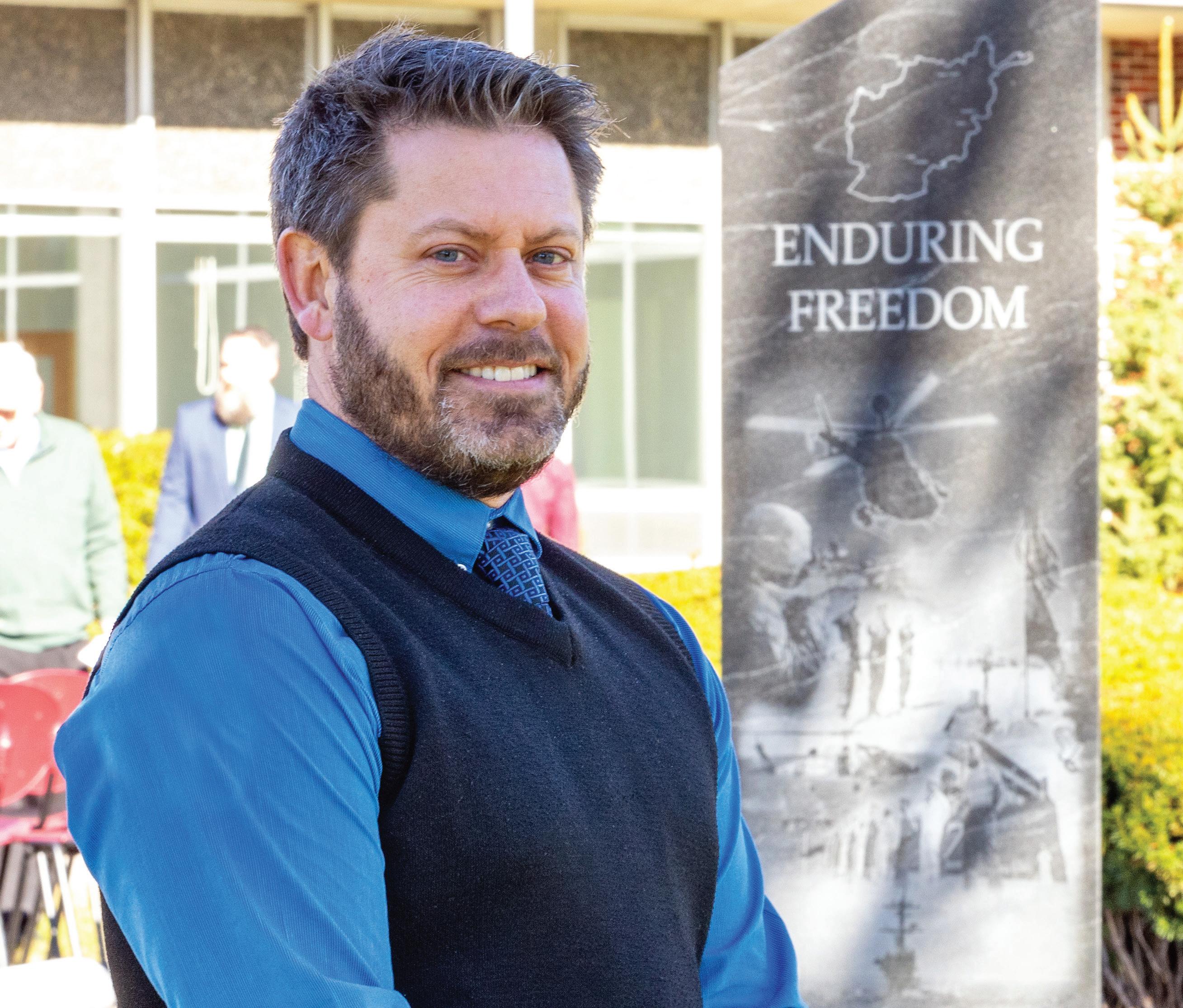
Duers attended SUNY Adirondack as a high school student, earning dual credits, then transferred to Crane School of Music to study orchestral percussion. He left the SUNY Potsdam program when his father died, attended classes at Schenectady County Community College for a while and performed with area symphonies.
After the difficult realization that music might not be a career for him, Duers enlisted in the United States Marine Corps. His late father was a Marine, as were his two brothers, his grandfather and a brother-in-law.
“The recruiter asked me, ‘Have you been to college? Do you have any skills?’ And I said, ‘Yeah, I’m a musician,’” Duers said. “He told me no one ever passes the audition.”
But Duers did and was offered the opportunity to choose his duty station, so he headed to Albany, Georgia, where the Marines maintain a 50-member Marine Band. “I loved it, it was a great gig,” he said. “We trained a lot, were active with the Marine Corps martial arts, pistol training. Some people think the band just plays instruments all day, and that’s not all we do. We’re warriors and musicians, a special breed.”
“I have such fond memories of SUNY Adirondack and had a great experience here.”
HOMETOWN: LAKE GEORGE, NEW YORK
2006 GRADUATE OF SUNY ADIRONDACK WITH A DEGREE IN HISTORY
2010 GRADUATE OF SKIDMORE COLLEGE WITH A BACHELOR’S DEGREE IN HISTORY AND GOVERNMENT
2012 GRADUATE OF UNION COLLEGE WITH A MASTER’S DEGREE IN HISTORY AND TEACHING
SERVICE: U.S. MARINE CORPS, 1999-2004
CURRENTLY: COORDINATOR OF ADIRONDACK PEER-TO-PEER SUPPORT SERVICES, A PFC JOSEPH P. DWYER PROJECT, A GRANT-FUNDED EFFORT TO ASSIST VETERANS IN WARREN AND WASHINGTON
A health issue discovered during his reenlistment medical exam led to Duers being medically discharged from the Marine Corps. “They couldn’t deploy me anymore and I knew I didn’t want to be a starving musician; I had all this money for school, so I started classes,” he said of his decision to attend SUNY Adirondack.
He studied history — “I was a much better historian than I was a musician,” he joked; was nominated for an Excelsior Award; and was selected to speak at graduation.
He transferred to Skidmore College, where he worked as a professional tutor while earning a bachelor’s degree. After graduating, he earned a master’s degree from Union College and jumped into a teaching career.

After a decade, Duers became disenfranchised by changes to the education system. “New initiatives in education
at the federal and state levels are changing the landscape of teaching,” the father of five said.
So, he decided to make a change. When he saw a posting for coordinator of Adirondack Peer-to-Peer Support Services, a grant awarded to SUNY Adirondack by Warren and Washington counties, he knew the role would be a good fit.
“I had a friend many years ago who wound up committing suicide,” he said, explaining how the pair were in the same unit for two years, but his friend was injured and medically discharged. “My friend struggled when he got out, he couldn’t acclimate to civilian life. He loved the Marine Corps and to all of a sudden be told, ‘You’re done,’ well, his life unraveled after that.”
“Veterans, we get a little weird; we’re strange. The military programs you for the mission,” Duers mused. “My
friend’s death really bothered me and I always felt, ‘What could I have done?’”
As coordinator of the PFC Joseph P. Dwyer Project program, Duers will work to develop a network for the region’s veterans. He has plans to start regular social events — hikes, bowling, coffee gatherings, rafting, whatever activities in which veterans are interested. Through regular interaction, he hopes to ensure veterans know how to obtain resources available in the region.
“We are trying to provide an opportunity for these guys to live life, re-acclimate to getting a new job, getting the treatment and service they earned and deserve.”
HOMETOWN: FORT EDWARD, NEW YORK
2019 GRADUATE OF SUNY ADIRONDACK’S STARTUP ADK U.S. AIR FORCE, 2009-2015
CURRENTLY: CO-OWNER OF EVERGREEN BICYCLE WORKS

HOMETOWN: QUEENSBURY, NEW YORK
1991 GRADUATE OF SUNY ADIRONDACK WITH A DEGREE IN CRIMINAL JUSTICE ARMY NATIONAL GUARD, 1993-1997 U.S. AIR FORCE RESERVES, 1997-2000 CURRENTLY: WARREN COUNTY SHERIFF

“The biggest takeaways were being exposed to all the different things I would have to work through starting a business.”
HOMETOWN: NISKAYUNA, NEW YORK
1983 GRADUATE OF SUNY ADIRONDACK WITH A DEGREE IN ENGINEERING
1984 GRADUATE OF RENSSELAER POLYTECHNIC INSTITUTE, BACHELOR OF SCIENCE IN MECHANICAL ENGINEERING U.S. NAVY, 1975-1981
CURRENTLY: RETIRED AFTER 34 YEARS AS A LICENSED PROFESSIONAL ENGINEER AND ACHIEVING THE RANK OF CAPTAIN IN THE NAVY RESERVES, RETIRING IN OCTOBER OF 2017
“The emphasis is on the student. The staff — teaching and administrative — they genuinely care. They see everybody — 60-year-olds, single moms, veterans with PTSD; the campus is genuinely a nurturing place. Other campuses would like to say that, but they can’t because the numbers are too high and their classes are too big,” Love said. “If I did it all again, I’d do it the exact same way.”
HOMETOWN: STILLWATER, NEW YORK 2016 GRADUATE OF SUNY ADIRONDACK WITH A DEGREE IN MARKETING, MANAGEMENT AND ENTREPRENEURSHIP U.S. ARMY, 1985-1988
CURRENTLY: DIRECTOR OF SALES AT D.A. COLLINS CO.
Graduating from SUNY Adirondack helped Manso fulfill a lifelong dream — and get ahead in the business world. “When I was 44, I was sitting around the dinner table with a bunch of friends and talking about our lives. My biggest disappointment was that I never got any kind of college degree,” said Manso, who worked at D.A. Collins. She registered for college in 2010. Balancing a career and school was


struggle at times, but Manso, who often studied in the conference room
lunch break,
“SUNY Adirondack is the perfect landing place for a veteran.”
“I was promoted to director of sales not even a full year after I got my degree, and they specifically said that it was because they saw me work so hard to get through college,” she said.
a
at work during her
is proud she put in the effort required to be successful.
HOMETOWN: SOUTH GLENS FALLS, NEW YORK
2018 GRADUATE OF SUNY ADIRONDACK WITH A DEGREE IN POLITICAL SCIENCE
U.S. AIR FORCE, 2004-2009
CURRENTLY: ANTHROPOLOGY AND SOCIOLOGY MAJOR AT VASSAR COLLEGE; AMBASSADOR AT PIN-UPS FOR VETS; DIRECTOR OF RESOURCES AT MOXXI WOMEN’S FOUNDATION
Moulton
Inspired
HOMETOWN: GLENS FALLS, NEW YORK
2020 GRADUATE OF SUNY ADIRONDACK WITH A DEGREE IN CULINARY AND BAKING ARTS

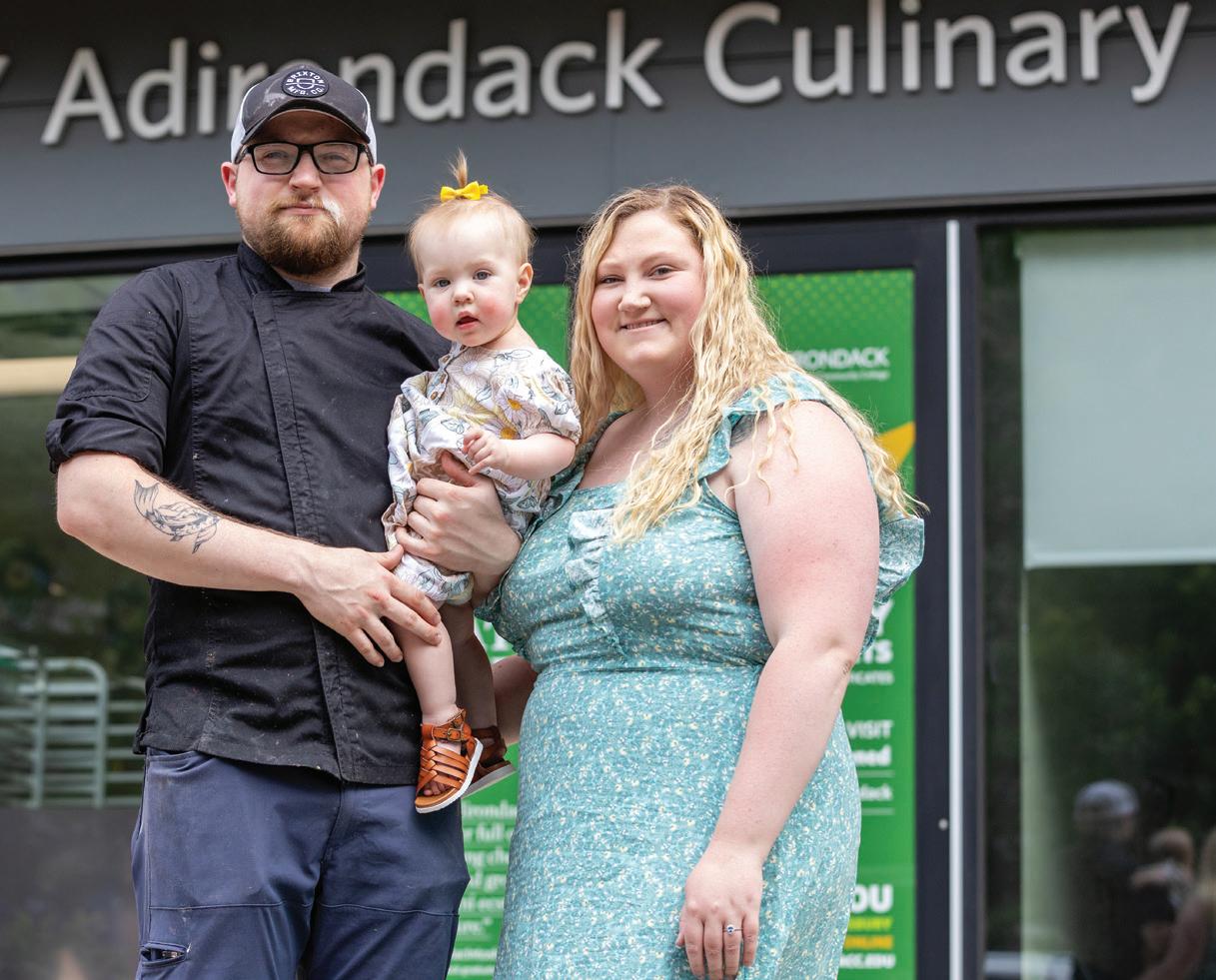
U.S. AIR FORCE, 2014-2018
CURRENTLY: GARDE MANGER AT FARMACY
Pelton graduated from Glens Falls High School in 2013 and enrolled in SUNY Adirondack’s Culinary Arts degree program. “I decided the program, as it was, wasn’t really for me,” he said. “I didn’t like having to do biology and math and all those different classes. I wanted to cook.” So he left college and joined the Air Force. After serving as an aircraft structural maintainer for four years, he returned to SUNY Adirondack, which was offering an Associate of Occupational Studies degree in Culinary and Baking Arts, a better fit for Pelton.
“What you put into it is what you get out of it.”
“SUNY Adirondack really showed me that I could be so much more.”was the first female president of the Veterans Club at SUNY Adirondack. The U.S. Air Force veteran is the mother of three children; a dual anthropology and sociology major at Vassar College; and holds multiple jobs.
HOMETOWN: NORTH CREEK, NEW YORK
2002 GRADUATE OF SUNY ADIRONDACK WITH A DEGREE IN COMMUNICATIONS AND MEDIA ARTS
2005 GRADUATE OF SUNY PLATTSBURGH WITH A BACHELOR’S DEGREE IN PSYCHOLOGY
2016 GRADUATE OF MISSISSIPPI STATE WITH A MASTER’S DEGREE IN STUDENT AFFAIRS
U.S. AIR FORCE, 2006-2010
CURRENTLY: ASSISTANT DIRECTOR OF REGISTRATION AND RECORDS, VETERANS SCHOOL CERTIFYING OFFICIAL
Thomas certifies veterans for benefits and assists them through the process of securing them — part of his job he’s particularly passionate about; helps bring in transfer credits; and performs a lot of technology-driven support, which feeds his lifelong love of computers. But mostly he loves working at SUNY Adirondack because he has been in situations similar to those of many prospective students.

HOMETOWN: LAKE GEORGE, NEW YORK
1986 GRADUATE OF SUNY ADIRONDACK WITH A DEGREE IN CRIMINAL JUSTICE U.S. MARINE CORPS, 1981-1987
CURRENTLY: SARATOGA COUNTY DISTRICT ATTORNEY’S OFFICE INVESTIGATOR; RETIRED NEW YORK STATE POLICE SENIOR INVESTIGATOR
Wells was in on the ground floor of developing a statewide network of field intelligence officers to assist in centralized counterterrorism reporting and investigation. He spent six months in a police executive fellowship program at FBI Headquarters, was assigned to the National Joint Terrorism Task Force in northern Virginia, worked in several different units of the FBI’s Counterterrorism Division, and had a fellowship in the Department of Homeland Security’s Office of Intelligence and Analysis in Washington, D.C.

“I love to bring students back who may not have thought they were fit for college or were intimidated by the idea.”
“I’ve had a great career and I got to do a lot of things I never thought I’d be able to do or see.”
SUNY Adirondack in June contracted with Warren County to operate Adirondack Peerto-Peer Support Services, A PFC Joseph P. Dwyer Project.

The program — named for U.S. Army Medic PFC Joseph P. Dwyer, a New York native who risked his life to aid an injured child in Iraq and struggled with post-traumatic stress disorder and substance use upon his return to the U.S. — is a peerto-peer program designed to help veterans face challenges of Post-Traumatic Stress Disorder (PTSD) and Traumatic Brain Injury (TBI).
To expand the program, Warren County administrators wanted to collaborate with an entity that could provide more resources for the region’s veterans. SUNY Adirondack was awarded the contract through a competitive proposal process.

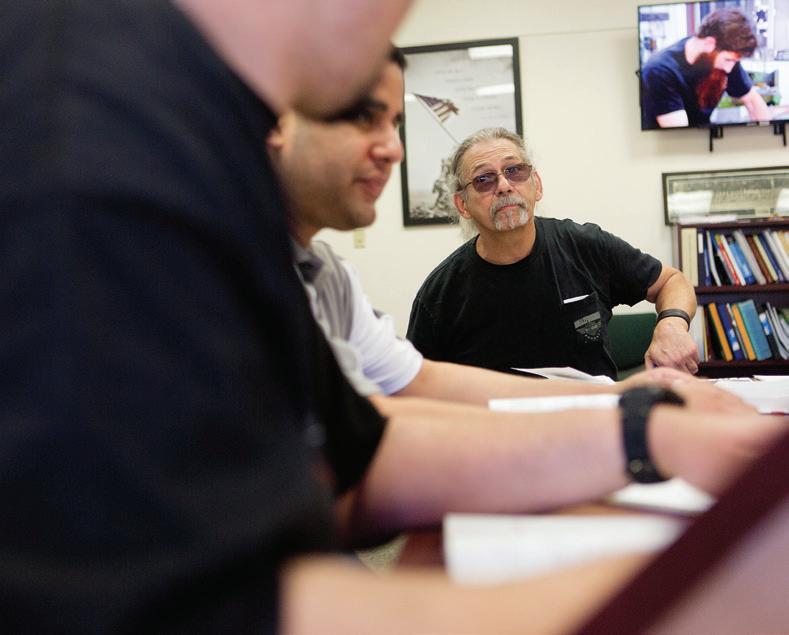
“SUNY Adirondack has a long history of supporting student
veterans and providing a space for all veterans in the community to access services and support,” said Kristine D. Duffy, Ed.D., president of SUNY Adirondack.
Former U.S. Marine and SUNY Adirondack alum Jeremy Duers was named coordinator of the program. (Learn more about Duers, Page 20.) He is working to develop programming that allows veterans to spend time with their peers and ensures they are aware of resources available to them.
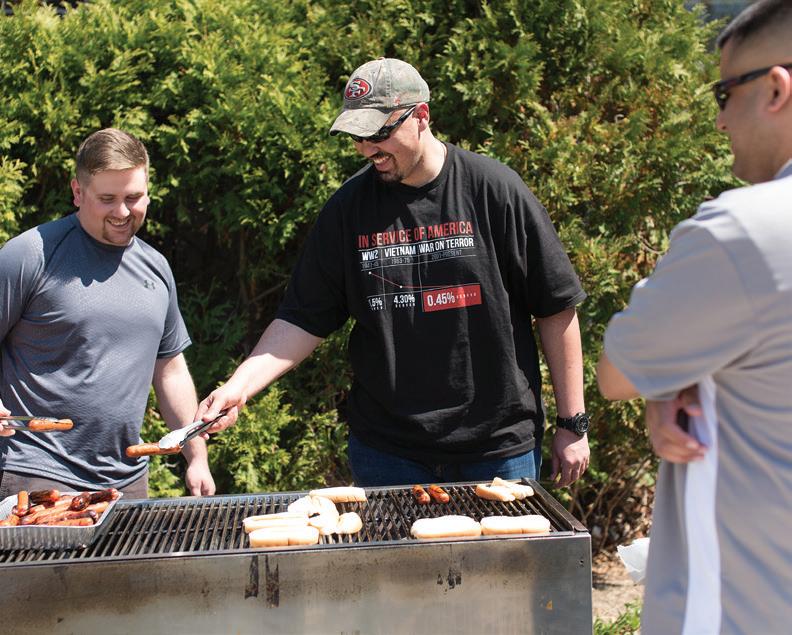
at SUNY Adirondack.
“To go from having a clear goal with a tight social support system in the form of fellow service members to having to find a new purpose, a new sense of meaning and belonging, is incredibly daunting and isolating. The Dwyer Veterans Peer Support program is incredibly important in connecting veterans in our area with their peers and offering non-clinical services for PTSD and TBI.”
Warren and Washington counties are among 25 in New York that operate a Peer-to-Peer program. Learn more at adkpeertopeer.org or use this QR code.

“Transitioning from military to civilian life can be one of the most difficult obstacles to overcome for veterans,” said Taylor Testa, a U.S. Marine Corps veteran and director of Student
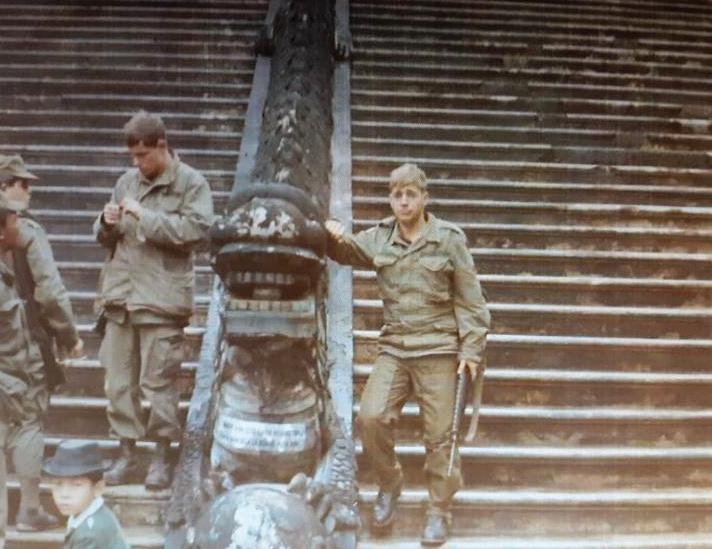
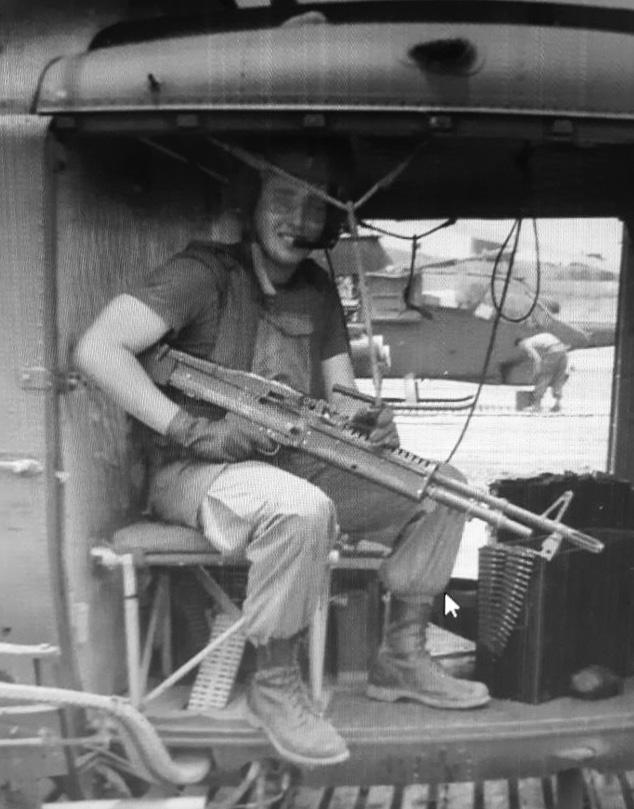



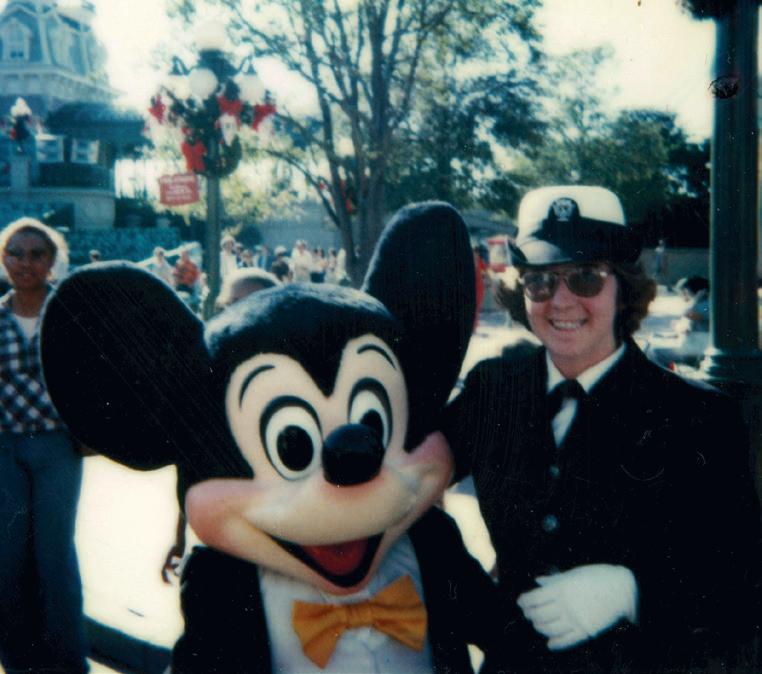
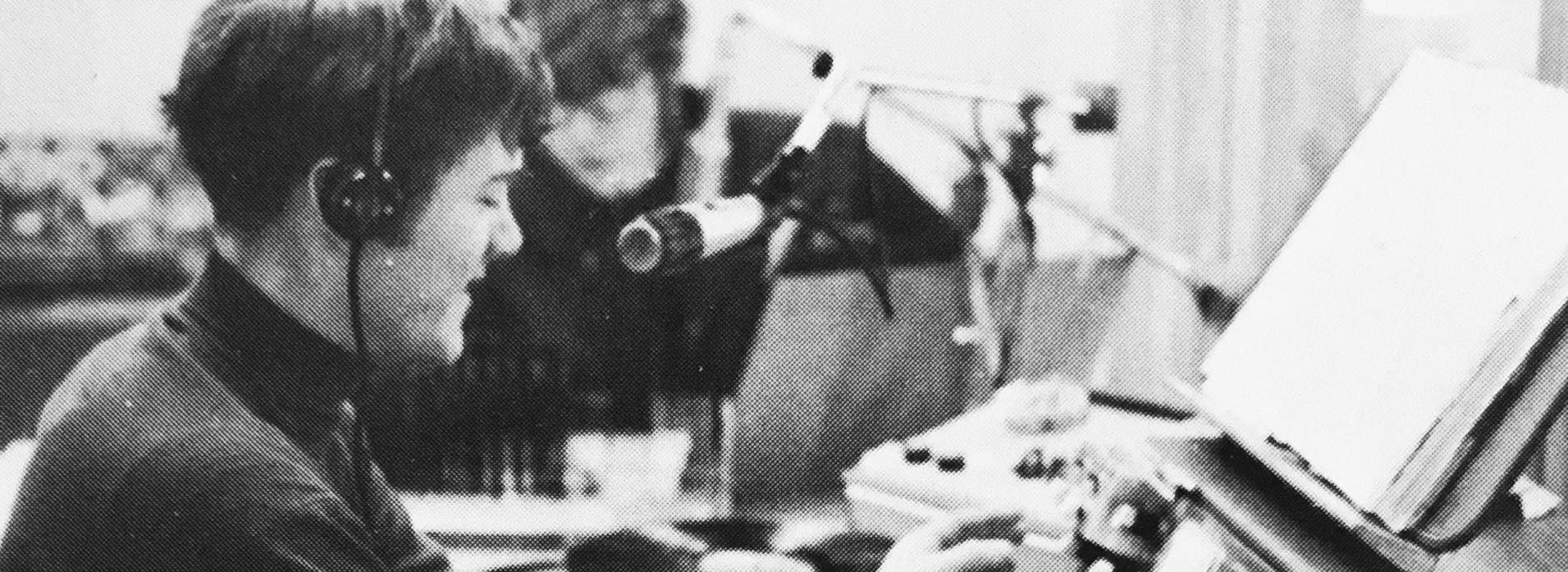
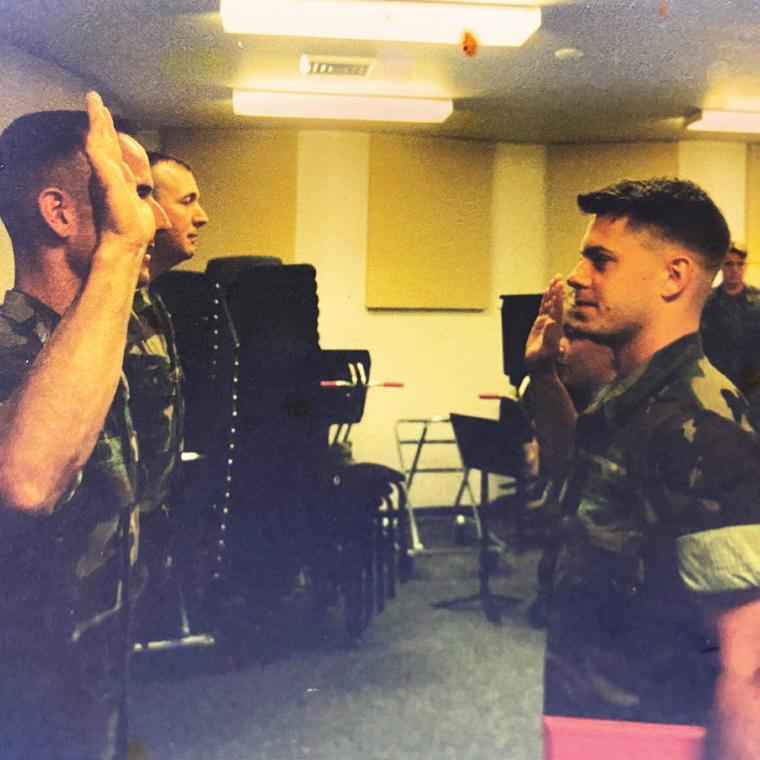


“I’m a life member of the Adirondack VFW Post No. 2475 Auxiliary, and I wanted to somehow honor the post’s veterans. Having graduated from and worked at SUNY Adirondack for 24 years, I knew the value of an education and I knew what a wonderful job SUNY Adirondack does providing various levels of education at an affordable price.
Designating SUNY Adirondack for an estate or planned gift — of any size — enrolls you as a Garnet Society member.
Recipients must be part-time students, like I was. It took me a while, but I’m proud of the work I did not only as a student at SUNY Adirondack, but also as a part-time student at Excelsior College after I earned my associate degree. Hopefully, I can give an American hero the same opportunity.”
For more information on how you can join this legacy giving society or to support the SUNY Adirondack Foundation and student scholarships, contact the SUNY Adirondack Foundation online at sunyacc.edu/give, by calling 518-743-2243 or by emailing foundation@sunyacc.edu.

So I decided to start a scholarship fund for the veterans of Post No. 2475 and/or their immediate families.
- Suzanne Appleyard, Class of 1980
“One of the finest legacies we can leave to our children, grandchildren and all future generations is a pathway to education.”
- Patricia Pietropaolo SUNY Adirondack Board of Trustees and Garnet Society member
Lisa Mitzen is co-founder of Business for Good, a nonprofit organization that supports community organizations and businesses. Profits earned by businesses Mitzen owns — including The Bread Basket and Hattie’s Restaurant & Chicken Shack — fund Business for Good, which donates to regional nonprofit organizations and helps entrepreneurs further develop their businesses.
She works to end homelessness, fight food insecurity and engage animal rights actions, through partnerships with The Lisa Mitzen Animal Care Center/ Mohawk Hudson Humane Society, The Handsome Cock Farm, Rebuilding Together Saratoga County, Shelters of Saratoga, The Giving Circle, Double H Ranch and Alzheimer’s Association, among others.
For more than 15 years, she worked as a mortgage lending manager for companies including Countrywide Home Loans, MetLife and Paragon Home Loans. She is a 1989 graduate of SUNY Adirondack and a 1991 graduate of SUNY Utica.
John Strough is a lifelong resident of Queensbury and longtime town supervisor.
Strough was a high school teacher for 37 years, retiring in 2011. From 2004 to 2013, he served as a town councilman and, in 2013, as deputy town supervisor. He was elected as town supervisor in 2014 and is serving in his fifth term.
He served on SUNY Adirondack’s Board of Trustees, Warren County Economic Developmental Council’s board, and several boards and committees dedicated to preservation of Lake George. He developed, designed and built the Rush Pond and Half Way Brook trail systems, and has overseen direction and implementation of major infrastructure projects and initiatives, including solar, fiber optics, lake and land preservation, and economic projects. Strough’s historical summations and articles and essays about land and water preservation have been published. He is a 1971 graduate of SUNY Adirondack, a 1974 graduate of University of Buffalo and has pursued graduate studies at University at Albany and other institutions.
Tanya Tobias-Tomis is executive director of Lake George Arts Project, a nonprofit organization that promotes exposure and income opportunities to professional and emerging artists, and provides quality arts programming to the Lake George region.
Tobias-Tomis has held numerous arts administration positions in the region, including at The Hyde Collection and Saratoga Arts. She is a member of Lake George Regional Chamber of Commerce Women in Business and Saratoga County Economic Opportunity Council’s LCAP fundraiser steering committee; serves on the Board of Directors for Adirondack Folk School; and in the past served on Hudson River Mill Museum’s Board of Directors.
She was an Americans for the Arts Emerging Leader Scholarship winner and an award panelist in 2009. Tobias-Tomis is a 1999 graduate of SUNY Adirondack, a 2001 graduate of University at Albany and earned a master’s degree from Skidmore College.
For more information on the Trailblazers, visit sunyacc.edu/trailblazers. To nominate an alum, please email alumni@sunyacc.edu or call 518-743-2244.

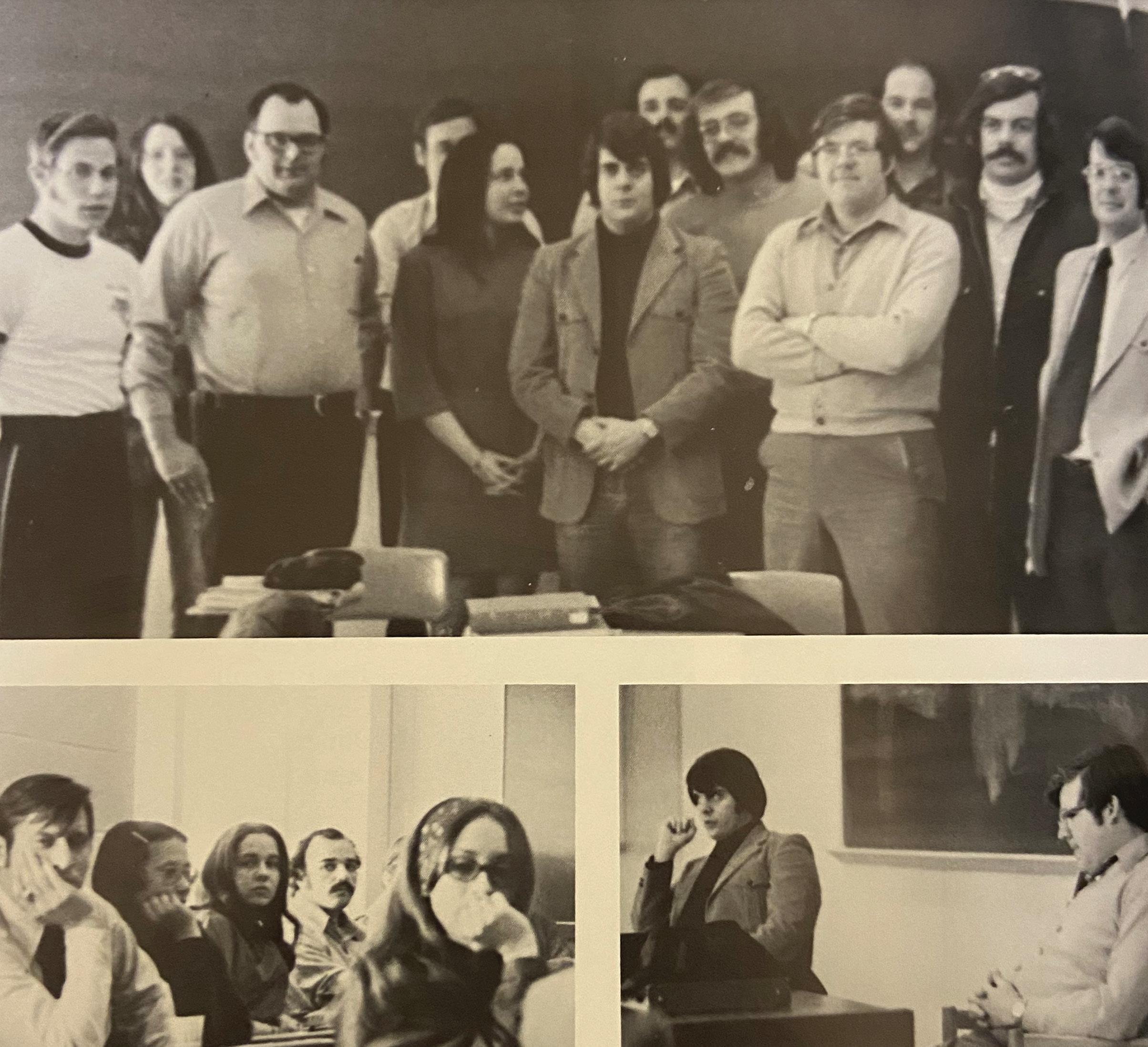
About a decade before our region’s officials started laying the groundwork of what would become Adirondack Community College to secure educational and career opportunities, the federal government approved the G.I. Bill™ to ensure our nation’s veterans have the resources necessary to succeed.
As a longtime educator, I often reflect on the impact of this legislation, which was originally passed in 1944. The act has gone through many iterations, but, simply put, provides veterans of the U.S. armed forces funding to attend college or pursue job training.
I can think of few other benefits as appropriate to offer the people who sacrifice so much of themselves for our country’s security and freedoms. When they’re ready to pursue an education — whether while serving, upon separation or even years after leaving the military — they receive life experience credits toward course requirements, financial support to cover living expenses while they focus on their studies, and money for tuition.
Training and education provide veterans opportunities to transition skills learned in service to everyday civilian applications, explore new areas of interest and find camaraderie among fellow veteran students.
The sense of discipline instilled in them during training and service makes them standout students and campus leaders. They serve as role models, demonstrating qualities one can learn only in high-pressure, high-stakes environments — responsibility, loyalty, respect, a sense of civic duty, focus.
We are proud to play a role, however small, in expressing our nation’s gratitude for service members by providing benefits they have more than earned. And mostly, we are honored to play a part in giving our nation’s veterans opportunities to build fulfilling new careers and establish healthy, happy civilian lives. That is the least we can do.
Sincerely,
Kristine D. Duffy, Ed.D. President
At SUNY Adirondack, veterans greatly enrich the campus experience. They bring with them different types of knowledge, new perspectives and invaluable insights, strengthening classroom discussions and social dynamics.
